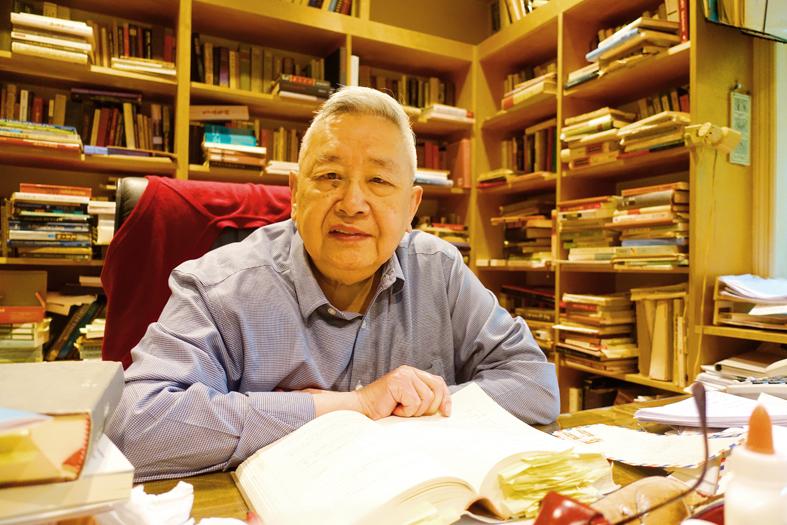Yu Ying-shih (余英時), described by his peers as the world’s greatest Chinese intellectual historian, on Sunday died peacefully in his sleep at his home in New Jersey, Academia Sinica said yesterday.
He was 91.
Academia Sinica issued two news releases in Chinese and English to pay respect to Yu.

Photo courtesy of Asian Culture Publishing
Yu was “an esteemed scholar and venerable public intellectual hailed as the greatest Chinese intellectual historian of his generation,” it said.
Yu’s works spanned the entirety of China’s history, which set him apart from most historians, with a narrow, epochal focus, it said.
Born 1930 in Tianjin, China, Yu studied under the Chinese historian Qian Mu (錢穆) at New Asia College in Hong Kong before obtaining a doctorate of history from Harvard University in Cambridge, Massachusetts, it said.
He was a pre-eminent figure in China studies, it said.
He was a research fellow at Academia Sinica; professor emeritus at Princeton University in New Jersey, and a professor at Harvard and an associate professor at the University of Michigan in Ann Arbor, it said.
Yu’s academic honors include the Tang Prize in 2014, the John W. Kluge Prize of the US Library of Congress in 2006, and the Executive Yuan National Cultural Award in 1991, it said.
Outside the rarefied circle of academics he was part of, Yu was a prominent public intellectual who sympathized with the movement toward freedom and democracy in Taiwan, as well as China, including Hong Kong, it said.
Yu mentored many young historians who later became prominent academics and prompted Academia Sinica’s Institute of History and Philology to establish a prize for young students that bears his name, it said.
Readers can glimpse a spectacular and broad world in Yu’s works, said former Academia Sinica vice president Wang Fan-sen (王汎森), a historian, adding that he had received instruction from Yu during his time at Princeton in the 1980s.
Yu was considerate toward his students and treated them as friends, Wang said.
He advocated democracy over revolution and supported Hong Kong’s democracy movements, he said.
Despite his criticism of Beijing — or perhaps because of it — Yu remained a respected figure in China’s public sphere.
The Paper, a state-owned digital media firm based in Shanghai, reported Yu’s passing in a report that largely cited the US Library of Congress’ effusive biography.
Chinese online shared thoughts on parts of Yu’s works allowed by Chinese censors, including an article against Western-centric interpretations of history, which was published in 2012 by Peking University as part of an anthology.
“This article is worthy of deep thoughts in the situation today,” one commenter wrote.

People can preregister to receive their NT$10,000 (US$325) cash distributed from the central government on Nov. 5 after President William Lai (賴清德) yesterday signed the Special Budget for Strengthening Economic, Social and National Security Resilience, the Executive Yuan told a news conference last night. The special budget, passed by the Legislative Yuan on Friday last week with a cash handout budget of NT$236 billion, was officially submitted to the Executive Yuan and the Presidential Office yesterday afternoon. People can register through the official Web site at https://10000.gov.tw to have the funds deposited into their bank accounts, withdraw the funds at automated teller

PEACE AND STABILITY: Maintaining the cross-strait ‘status quo’ has long been the government’s position, the Ministry of Foreign Affairs said Taiwan is committed to maintaining the cross-strait “status quo” and seeks no escalation of tensions, the Ministry of Foreign Affairs (MOFA) said yesterday, rebutting a Time magazine opinion piece that described President William Lai (賴清德) as a “reckless leader.” The article, titled “The US Must Beware of Taiwan’s Reckless Leader,” was written by Lyle Goldstein, director of the Asia Program at the Washington-based Defense Priorities think tank. Goldstein wrote that Taiwan is “the world’s most dangerous flashpoint” amid ongoing conflicts in the Middle East and Russia’s invasion of Ukraine. He said that the situation in the Taiwan Strait has become less stable

CONCESSION: A Shin Kong official said that the firm was ‘willing to contribute’ to the nation, as the move would enable Nvidia Crop to build its headquarters in Taiwan Shin Kong Life Insurance Co (新光人壽) yesterday said it would relinquish land-use rights, or known as surface rights, for two plots in Taipei’s Beitou District (北投), paving the way for Nvidia Corp to expand its office footprint in Taiwan. The insurer said it made the decision “in the interest of the nation’s greater good” and would not seek compensation from taxpayers for potential future losses, calling the move a gesture to resolve a months-long impasse among the insurer, the Taipei City Government and the US chip giant. “The decision was made on the condition that the Taipei City Government reimburses the related

FRESH LOOK: A committee would gather expert and public input on the themes and visual motifs that would appear on the notes, the central bank governor said The central bank has launched a comprehensive redesign of New Taiwan dollar banknotes to enhance anti-counterfeiting measures, improve accessibility and align the bills with global sustainability standards, Governor Yang Chin-long (楊金龍) told a meeting of the legislature’s Finance Committee yesterday. The overhaul would affect all five denominations — NT$100, NT$200, NT$500, NT$1,000 and NT$2,000 notes — but not coins, Yang said. It would be the first major update to the banknotes in 24 years, as the current series, introduced in 2001, has remained in circulation amid rapid advances in printing technology and security standards. “Updating the notes is essential to safeguard the integrity